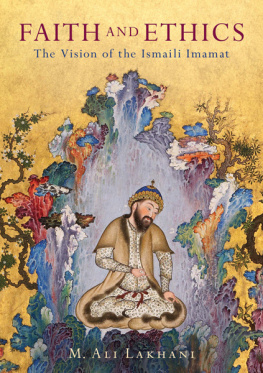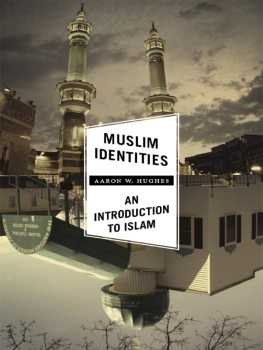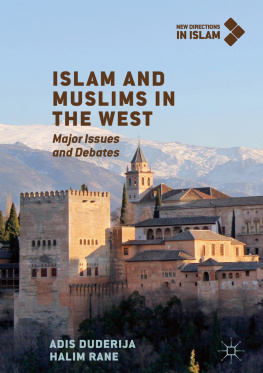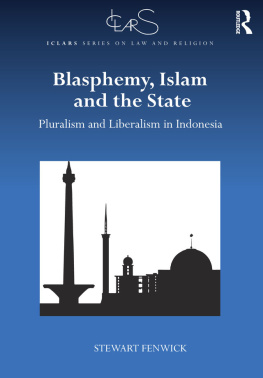ISLAM AND SOCIAL WORK
Culturally sensitive practice in a diverse world
2nd edition
Sara Ashencaen Crabtree, Fatima Husain and Basia Spalek
First published in Great Britain in 2017 by
Policy Press University of Bristol 1-9 Old Park Hill Bristol BS2 8BB UK Tel +44 (0)117 954 5940 e-mail pp-info@bristol.ac.uk www.policypress.co.uk
North American office: Policy Press c/o The University of Chicago Press 1427 East 60th Street Chicago, IL 60637, USA t: +1 773 702 7700 f: +1 773-702-9756 e:sales@press.uchicago.edu www.press.uchicago.edu
Policy Press 2017
British Library Cataloguing in Publication Data
A catalogue record for this book is available from the British Library.
Library of Congress Cataloging-in-Publication Data
A catalog record for this book has been requested.
ISBN 978-1-4473-3010-3 paperback
ISBN 978-1-4473-3009-7 hardcover
ISBN 978-1-4473-3011-0 ePub
ISBN 978-1-4473-3012-7 Mobi
ISBN 978-1-4473-3013-4 ePdf
The right of Sara Ashencaen Crabtree, Fatima Husain and Basia Spalek to be identified as authors of this work has been asserted by them in accordance with the 1988 Copyright, Designs and Patents Act.
All rights reserved: no part of this publication may be reproduced, stored in a retrieval system, or transmitted in any form or by any means, electronic, mechanical, photocopying, recording, or otherwise without the prior permission of Policy Press.
The statements and opinions contained within this publication are solely those of the authors and not of The University of Bristol or Policy Press. The University of Bristol and Policy Press disclaim responsibility for any injury to persons or property resulting from any material published in this publication.
Policy Press works to counter discrimination on grounds of gender, race, disability, age and sexuality.
Cover design by Policy Press
Front cover: image kindly supplied by istock
Readers Guide
This book has been optimised for PDA.
Tables may have been presented to accommodate this devices limitations.
Image presentation is limited by this devices limitations.
Dedicated to Jonathan and in loving memory of Jack and my mother, Elvira Ranz y Diez de Artzcoz. SAC
To my children, Sakina and Zakary and my parents, with immense gratitude. FH
Dedicated to the memory of Jo Campling. BS
Sara Ashencaen Crabtree is Professor of Social & Cultural Diversity at Bournemouth University, UK.
Fatima Husain is Research Director for the Children, Families and Work Team, NatCen Social Research, UK.
Basia Spalek is Professor in Conflict Transformation at the University of Derby and Director of Research for Assist Trauma.
Contents
List of case studies, figures and tables
Case studies
Figures
Tables
Acknowledgements
A number of people assisted in the development of this book, some of whom cannot be named. Nonetheless I would like to thank all the anonymous individuals in the UK, the Far East and the Middle East who contributed their stories. To those who happily can be named, I owe a real debt of gratitude to Furqan Taher of Muslim Youth Helpline, my former social work student, Ahmed Jama, as well as Farzana Beg and Liz Gould of ROSHNI, David Pitcher of CAFCASS and Julie Siddiqi of the Siddiqi Charitable Foundation. I would also like to acknowledge colleagues with whom I have worked over the years, who helped me to develop my understanding of Islam further: Professor Ismail Baba, Dr Belkeis Altareb, Dr Abdullahi Barise and Professor Alean Al-Krenawi are four names that come to mind in this respect.
My loving thanks are due to my husband and comrade, Professor Jonathan Parker, for his endless faith, help and devotion. A harassed mothers gratitude is owed to my young daughters, Isabel and Miranda, who have been so good-natured and encouraging about the long hours spent labouring over this new edition, with the occasional much needed reminder about how there is more to life than publishing deadlines. Here, too, I also wish to commemorate two important people without whom the first edition of this book would certainly never have been written: Jo Campling, who helped to bring the original book to fruition and second, the great help and encouragement given by my late husband, Professor Jack Crabtree. Both Jo and Jack went beyond the call of duty to assist me in the publication of this book right up to the final days of their lives. Additionally, of course, this book would certainly have been greatly impoverished, and almost certainly impossible to complete in its current form, without the invaluable help of my two colleagues, Dr Fatima Husain and Professor Basia Spalek. Last but not least I would like to thank the editorial staff at Policy Press for offering such an efficient but friendly service that always felt totally person-centred.
Sara Ashencaen Crabtree
ONE
Introduction
Paradoxically both little and much has changed since the first edition of Islam and Social Work: Debating Values, Transforming Practice. The first volume sought to draw attention to the marginal status of Muslims in the Global North, together with the wealth and depth of Islamic heritage and how these could serve to enrich social work. Today, marginal status remains a continued feature of Muslim minority groups along with concentrated levels of social scrutiny and, arguably, disproportionately so in respect to their population size or influence. What then has changed in terms of both perceived needs and risks? How do and should social workers view and seek to work constructively with Muslim service users and client groups? These are some of the questions that this, the second edition, seeks to answer.
Aims and scope
On the bookshelves of those with a genuine interest in social work, the chances are that there will be at least one well-thumbed text on the issue of race and ethnicity and how this relates to, and the impact it has on, social work practice. So complex is this area that it continues to provide a rich source of academic inquiry, resulting in impassioned debate. The best known of these polemics rightly continue to feature on every social work students reading list, and therefore we shall not spend too much time in revision here.
Under these circumstances, it may seem rather unlikely therefore that there can be anything new to add to this topic, especially where social work could well be viewed by other professions as being extremely well supported by the volume of information available on the market. However, at the same time, never before in living memory has there been so much focus devoted to a proliferation of articulated concerns from the media, politicians and the general public regarding the question of the social integration of Muslim minority ethnic (ME) groups in the west (Solomos, 2003).
This is normally framed in relation to the perceived irreconcilable conflict between the cultural values and practices of European nations and those of migrants from other cultures. In the early 2000s two murders took place in the Netherlands, a country well known for its liberal social policy, which appeared to underline the difficulties of multiculturalism in Europe. The first murder was that of outspoken politician, Pim Fortuyn, who espoused xenophobic and Islamophobic rhetoric on the grounds of the threat to Dutch liberal values posed by migration (Marranci, 2004). Theo van Gogh, the controversial film director, was later murdered by a perpetrator embracing extremist interpretations of Islam after training as a social worker, a rich irony that will not be lost on readers (Ahmed, 2005). Since then the threat of religious extremism has taken a more gory and sinister path in the form of the so-called Islamic State of Syria and Levant (variously known as ISIS, ISIL, IS or Daesh), in Iraq and Syria and the targeting of soft targets in the Middle East and in Europe. The flow of refugees escaping war and seeking safety within the EU has been a consequence of this. Images of desperate journeys and huddled masses walking miles with children, the elderly and the infirm, has led to a huge humanitarian response, one which has been countered by political responses embedded in the fear of Muslims as well as of migration by those identified as other. This is particularly the case for the UK, where a bid by the House of Lords to allow entry to 3,000 unaccompanied children residing in camps in France was rejected by the House of Commons.











